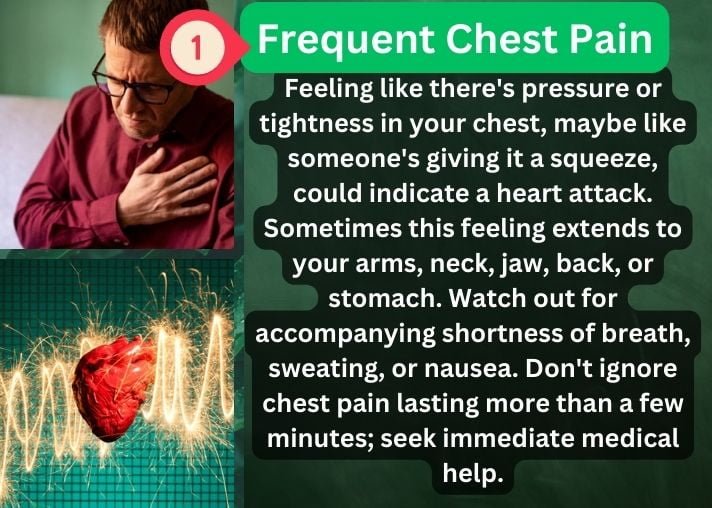
Chest Discomfort: Feeling like there’s pressure or tightness in your chest, maybe like someone’s giving it a squeeze, could indicate a heart attack. Sometimes this feeling extends to your arms, neck, jaw, back, or stomach. Watch out for accompanying shortness of breath, sweating, or nausea. Don’t ignore chest pain lasting more than a few minutes; seek immediate medical help.
Feeling Exhausted: Sure, tiredness after a rough day is normal, but feeling more fatigued than usual without a good reason might be a sign. Your heart might be struggling, making you feel extra tired. Did you know about 70% of women feel this way before a heart attack?
Dizziness: Feeling lightheaded or like the room’s spinning could be due to various reasons, including a possible heart attack, especially if paired with chest pain or trouble breathing.
Upset Stomach: Yep, tummy troubles like indigestion, nausea, or feeling bloated might be signals. Sometimes we overlook these symptoms, mistaking them for something else. Listen to your body and don’t ignore unusual signs.
Sweating: Sweating a lot or breaking into a cold sweat without a good reason might be your body’s way of warning you. When your body’s in trouble, it can react by making you sweat more than usual.
Swelling in Legs/Feet: Weird swelling in your legs, ankles, or feet might signal something’s not right with blood circulation throughout your body.
Heartbeat Irregularities: Feeling like your heart’s racing, especially after that extra cup of coffee, might not just be the caffeine. In some cases, it could signal atrial fibrillation, a condition where the heart isn’t getting enough blood.
Pain Elsewhere: Besides chest pain, discomfort in other body parts like arms, back, neck, jaw, or stomach could indicate trouble. It might feel like pressure or squeezing and can come and go or last a while.
Breathing Trouble: Feeling like you can’t catch your breath or having difficulty breathing could be a sign. This might come with wheezing or coughing. If it’s hard to breathe, get medical help pronto.
What Should You Do If You Have Heart Attack Symptoms?
If any of these symptoms pop up, don’t wait—get help fast:
Dial 911 immediately for an ambulance.
If you’ve got aspirin and aren’t allergic, chew and swallow one 325-milligram tablet to improve blood flow.
Rest and try to stay calm. Avoid physical activity and take slow, deep breaths.
Share info about your symptoms and medical history with the emergency team when they arrive.
Preventing Heart Attacks
Here’s how to lower your risk:
Healthy Lifestyle: Eat well, exercise regularly (aim for at least 30 minutes most days), and maintain a healthy weight.
Quit Smoking: If you smoke, stop. It’s a big risk factor for heart disease.
Manage Conditions: Keep high blood pressure, cholesterol, and diabetes in check with proper meds and lifestyle changes.
Reduce Stress: Try relaxation techniques like meditation or yoga to manage stress levels, which can hike up heart attack risks.